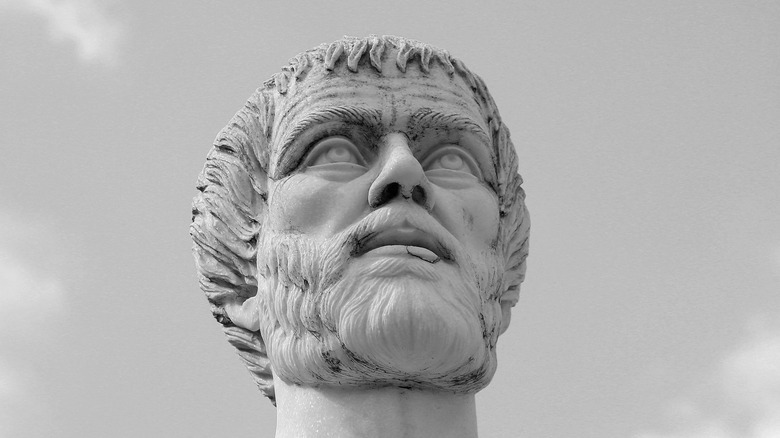What You Might Not Know About Aristotle's Childhood
"Those who know, do. Those that understand, teach," said Aristotle, a philosopher from Ancient Greece. Apropos words for the man who became the teacher of Alexander the Great. King Philip II of Macedonia asked him to tutor his son in 343 BCE and the philosopher spent the next seven years in that position. The lessons he taught resonated with the young man and Alexander the Great took his teacher's books with him during his military campaigns, something Aristotle — who still exchanged letters with his protégé — encouraged. As he conquered lands, Alexander showed other cultures his old tutor's concepts, and Aristotelian philosophies influenced the development of thought (from World History). He was celebrated as "The First Teacher," according to History.
In exchange for educating his son, King Philip II aided Aristotle's birthplace, Stagira, freeing its people from slavery. But the action was far from bountiful since Philip was also the one who had destroyed the town and sent its citizens into bondage six years before hiring the philosopher (via Smithsonian Magazine).
Aristotle believed in teaching students the important subjects — logic, physics, rhetoric, politics, and philosophy. He believed in it so much so that he opened his open school in Athens, the Lyceum, after leaving his palace teaching position, according to Ducksters. Although he had studied under Plato, they differed on certain beliefs and Aristotle sought a space to teach inductive and deductive reasoning, universal laws, and other philosophies he developed since his childhood (as per Athens & Beyond).
An early death changes Aristotle's childhood
The influential thinker came from an educated family; his father, Nicomachus, served the Macedonian king, Amyntas II, as court physician. It is likely that Aristotle might have also gone into medicine if his father didn't die when he was about 10, according to MacTutor. During Aristotle's time, doctors often trained their sons in the practice, and the philosopher could have spent time with his father when he worked. It is thought that his mother, Phaestis, also died early. Proxenus of Atarneus, an uncle or a family friend, took over guardianship of Aristotle and supervised his education, teaching him subjects like rhetoric and poetry.
When Aristotle turned 17, Proxenus sent him to the Academy, an Athens-based school founded by another Greek philosopher, Plato, said History. He stayed there for 20 years, first as a student and then he became a teacher. While respectful of his teacher, Aristotle never embraced all of his theories and often contradicted some of Plato's main philosophies. After Plato died in 347, his nephew Speusippus took it over, and Aristotle left. Why he departed (or if it had to do with politics), is not known.
The importance of Aristotle
After an invitation from Hermias, the ruler of Atarneus and Assos in Mysia, Aristotle joined his court, staying for three years and marrying his niece, Pythias, according to ThoughtCo. Aristotle accomplished much of his great work while at The Lyceum (see remains in above photo). He created about 200 writings, including some notes and some manuscripts (only 31 of which survive), said History. The collection covers a variety of topics, from logic and science to mathematics and ethics. He died in 322, a year after he fled Athens, a changed city after Alexander the Great passed in 323 B.C. and anti-Macedonian feelings heightened.
Some of his achievements might surprise you. He was the founder of zoology, for instance, and he used empirical research that he described in his work as well as listing observations. He was also the first to connect psychology to physiology, and write a book, "De Anima," or "On the Soul" about it. In "Poetics," his treatise on art and poetry (much of it captured by pupils during his classes), he separated drama into its two famous segments: tragedy and comedy (from Ancient History Lists). Although more than two thousand years have passed since his death, Aristotle is still influential today.


![]Lyceum Aristotle school remains](https://www.grunge.com/img/gallery/what-you-might-not-know-about-aristotles-childhood/the-importance-of-aristotle-1631283800.jpg)